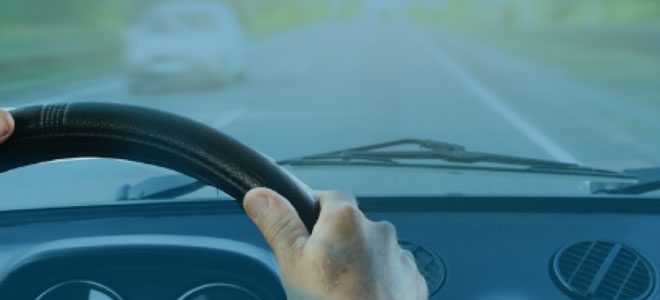Car Accidents in Costa Rica – 6 Steps to Know+Stats
If you are involved in a traffic accident in Costa Rica the process is a bit different than that of North America. Here is what to expect, and how to handle the situation. Driving in Costa Rica is a challenge. It is about being aggressive enough to reach your destination and being prepared for a multitude of possible reactions of others drivers. If you end up in a traffic accident this is what you should do.
Step 1 - Keep Calm
You probably expected this one, along with the typical advice of never leaving the scene of an accident. While this is a hard fast rule in the United States, hit and runs are common in Costa Rica. If the other driver has left the scene, stay where you are and get an accident report from your insurer which is most likely INS.
Step 2. Don’t Move Your Vehicle
In Costa Rica vehicles involved in accidents are left where they are until an inspection can take place. This is what those reflective triangles in your car kit are for. Place these triangles in intervals of about 15 feet to alert other drivers that they are approaching an accident. In the case of a blind corner or hazardous area you could have an individual placed to flag vehicles and get their attention before coming right up on the scene.
Step 3 - Call 911
If it is more than a minor fender bender. This might seem exaggerated, if there are no visible injuries but it is better safe than sorry and 911 will also coordinate the inspection with the Transito Police. These officers handle only traffic related incidents. They will come to the scene, perform a site inspection, and complete a report.
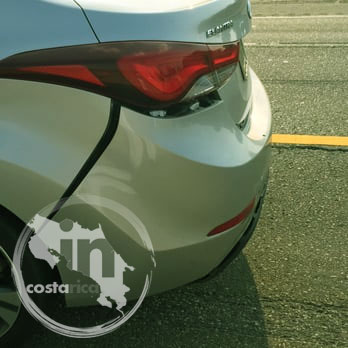 Step 4 - Get the Facts and call your insurer.
Step 4 - Get the Facts and call your insurer.
It is fine for you to take photos of the scene, any contributing factors and the license plates of the cars involved. It is also recommended that you get names and contact information from witnesses. It is not a good idea to argue with the other driver, or discuss the incident with any of the witnesses.
Most vehicles in Costa Rica are insured with the Instituto Nacional de Seguros (INS) look in the glove compartment to confirm this and call their toll free number which is 800-800-8000. If you have another insurance provider their contact details will be in the proof of insurance paperwork in the glove compartment.
Step 5 - Answer the questions of the Transit Police and provide your information.
While they may not speak english just be patient and they will get someone that will be able to take your statement or ask any necessary questions. Note that it in some cases it could take even a few hours for an official to arrive on the scene.
Step 6: Removing your vehicle from the scene.
Typically the Transit Police will arrange for the vehicle to be transported to one of their yards. Depending on the severity of the accident you may be given the opportunity to remove the vehicle yourself, by organizing your own tow truck. This is also the time to consider whether or not you need an attorney. If you are unsure you can consult an attorney and present your photos, copy of the incident report and your side of the events.
Things you also may want to know about handling an accident in Costa Rica.
Got a ticket?
At the end of the Transit Police inspection they may issue you a ticket. You have 10 business days to take action on this. This again may be where you want to consult an attorney.
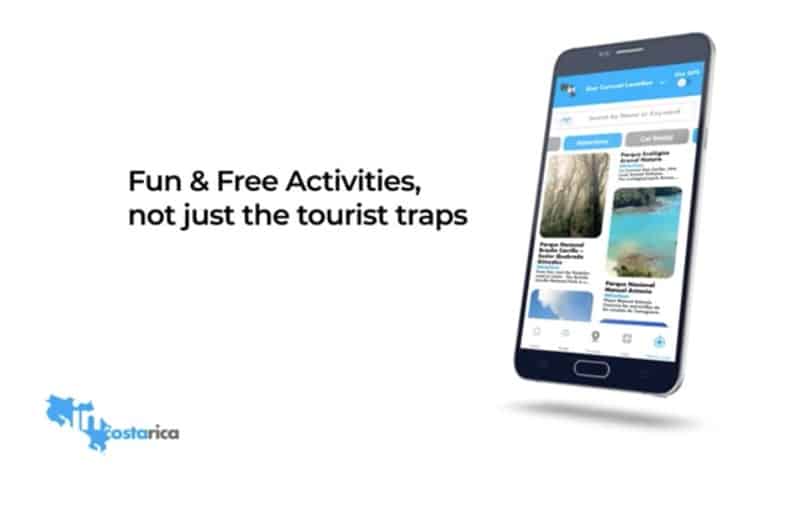
 Get More Out of Costa Rica
Get More Out of Costa Rica
InCostaRica Mobile App
Accidents are Registered To The Vehicle:
Vehicles involved in accidents may have the accident registered until there is a resolution. If a vehicle has a “Gravamen” (lien) it cannot be sold or transferred. You can check this by running a search on the COSEVI website at https://www.csv.go.cr/consulta-infracciones-publica. It will also show if there are any unpaid tickets.
Negotiating with the other driver:
For basic fender benders it is possible to negotiate with the involved party and avoid the process of dealing with insurers. This is fairly common, especially in cases where there is only cosmetic damage. The last time I did this it was for knocking over a parked motorcycle, and the mirror broke off. The other driver was quite happy with his 15,000 $28) colones as the repair probably only cost him 5,000 ($9).
When in doubt, ask an attorney:
Costa Rica has thousands of attornies and after living here for 15 years I can see why. You end up using their services for just about everything. If you are unsure of what to do, invest the money in getting an attorney. You will probably be looking at prices starting from $100 and going up depending on how much they need to do.
USER COMMENT - Diane F: This article is lacking. here is what you need to do: take pictures, lots of them-especially if not at fault. Too many ‘at fault ‘ people know how to work the system and end up blaming you. Find witnesses and officially name them when you file at court. Have your insurance agent or attorney help you meet all required deadlines, court appearance, etc. Don't just assume all will work out, even when you are innocent. Too many gringos found at fault when they weren't. Don’t try to go this alone, unless you truly know the system.
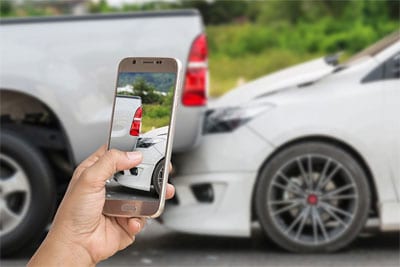
Handling a minor accident in Costa Rica:
As mentioned above you can negotiate with the other driver or involved person in the accident. To protect yourself a special form provided by Costa Rica’s Department of Transportation should be used. Since 2016 this has been a legal way to handle minor accidents, and was designed to facilitate the transit police so they only need to visit accidents where their presence was actually required.
In order to use the form, both parties must agree on who the responsibility party was and the compensation for said accident. In some cases it may be that each driver will cover the repairs of their vehicles individually.
The form can be downloaded from the INS website here.
INS Minor Accident Report Form
Quick Facts about accidents in Costa Rica:
- Traffic Accidents have gone up by 72% in the last three years
- Someone requires medical attention every 12 minutes from accidents in Costa Rica
- In 2017 there were 44,000 accident victims that required attention.
- 445 fatalities were reported in 2018.
- 201 of the fatalities in 2018 were involving motorcycles
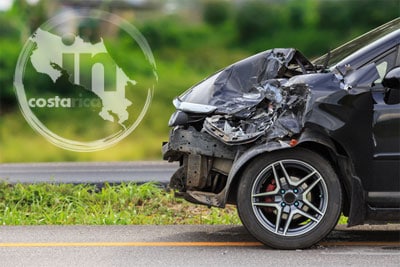 Causes of Traffic Accidents in Costa Rica
Causes of Traffic Accidents in Costa Rica
As you saw in the facts above traffic accidents are a major cause of death and injury in Costa Rica. Age is also a factor. Studies have shown that those between the ages of 20-39 and above 70 are more likely to be involved in a vehicle accident than the other age groups.
The Human Factor:
Nearly every accident on the roadways of Costa Rica is caused by human error. Not knowing the size of their vehicle, losing control, or just being overly aggressive are all contributing factors. Of Course using a cellphone while driving is illegal here but common place, despite the steep fines.
Mechanical Failure:
Even though Costa Rica has some pretty rigorous inspections every year for the vehicles, mechanical failure is also a factor. Ensuring that your car is in proper condition will help with this. Keep your foot off the brake on Costa Rica’s hilly roads will ensure that they don’t overheat and are there when you really need them.
Climate and Natural Conditions:
Heavy rains are the primary culprit here. They can wash debris onto roadways especially on the Highway 27. Blow downs of trees also occur, and the narrow winding roads don’t help. Even just rain on the roads is dangerous. Roads in Costa Rica rarely have a sufficient slant to shed the massive amount of water that can accumulate in just a few minutes of heavy rainfall.
Phone Numbers for Traffic Accident Reporting
Transit Police Phone Numbers
2222-9330
2222-9245
INS (National Insurance)
800-800-8000
Costa Rica Traffic Fatalities By The Numbers
The following statistics were collected by Costa Rica’s deparment of Transportation (MOPT) Here is the full report.
2018 Vehicle Accident Deaths in Costa Rica (Spanish)
Traffic Fatalities by Area/Province in 2018
- Alajuela - 100
- Cartago - 21
- Guancaste - 59
- Heredia - 34
- Limon - 63
- San Jose - 86
Total Fatalities in 2018 - 445
Traffic Fatalities by Vehicle Type and User in 2019
- Motorcyclist - 178
- Motorcycle Passengers - 24
- Drivers - 98
- Car Passengers - 46
- Bicyclist - 40
- Bus Passengers - 3
- Pedestrians - 56
Traffic Fatalities by Gender in 2019
- Men - 338
- Women - 56
- Unknown - 1
Traffic Fatalities by Time of Day (24 Hour)
- 0000-0600 - 142
- 0600-1200 - 76
- 1200-1800 - 96
- 1800-2400 - 131
Costa Rica Traffic Fatalities by Day of the Week:
- Monday - 40
- Tuesday - 41
- Wednesday - 57
- Thursday - 54
- Friday - 64
- Saturday - 85
- Sunday - 104



